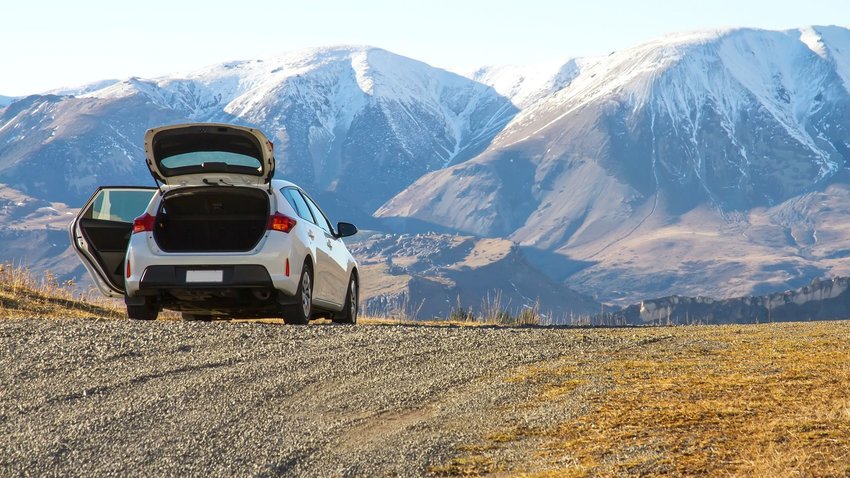Most of the credit cards in your wallet probably advertise some form of rental car insurance, but if you don't read the fine print, you'd be forgiven for thinking that all of the policies were basically the same.
And while all cards have specific caveats about the types of vehicles and locations that are eligible for coverage, there's one fault line that clearly separates the best rental car insurance policies from the rest: primary vs. secondary coverage.
The Discoverer has partnered with The Points Guy affiliate network for our coverage of credit card products. The Discoverer and The Points Guy may receive a commission from card issuers. The offers mentioned below are subject to change at any time and some may no longer be available.
Primary vs. Secondary Insurance

Secondary rental car insurance, which is the far more common variety, only kicks in to pay for damages after you've exhausted the limits of your personal auto insurance policy. So if your own car insurance covered up to $50,000 in property damage, and you totaled a rental car worth $40,000, the credit card company wouldn't have to pay a cent. You'd have to coordinate with your own auto insurance company, where you'd be on the hook for your full deductible, as well as the inevitable hikes to your premiums.
Primary insurance, as you've likely guessed, covers damages before your personal policy. And if your credit card insurance is sufficient to cover any damages, you won't have to notify your insurer at all. Obviously, nobody wants to get into a wreck in their rental car, but if you do, it can't be overstated how big a difference this will make in the aftermath.
The Best Cards With Primary Insurance

These are our favorite cards that include primary rental car insurance, though the exact details of their policies can vary somewhat. We've included the highlights of what they cover and don't cover below, but these aren't exhaustive lists, so be sure to read the details of your card's agreement.
Chase Sapphire Reserve
Annual Fee: $550
What It Covers:
- Up to $75,000 in collision damage on rentals of up to 31 consecutive days
- Reasonable towing charges related to a covered loss
- Valid loss-of-use charges incurred by the rental car agency
What it Doesn't Cover:
- Specialized vehicles like vans, mopeds, trucks, limousines, and RVs
- Injury of anyone or anything inside or outside of the vehicle
- Any violation of the auto rental agreement
- Loss or theft of personal belongings
Chase Sapphire Preferred® Card
United Explorer Card
Annual Fee: $95 (waived in the first year for the United Explorer card)
What They Cover:
- Up to the full value of the rental vehicle on rentals of up to 31 consecutive days
- Reasonable towing charges related to a covered loss
- Valid loss-of-use charges incurred by the rental car agency
What They Don't Cover:
- Luxury vehichles such as Maseratis and Aston Martins
- Specialized vehicles like vans, mopeds, trucks, limousines, and RVs
- Injury of anyone or anything inside or outside of the vehicle
- Any violation of the auto rental agreement
- Loss or theft of personal belongings
The Platinum Card® From American Express
Hilton Honors American Express Aspire Card
Delta SkyMiles® Platinum American Express Card
Annual Fee: $550
Note: American Express's premium cards include secondary insurance by default, though you can pay a flat rate of $19.95 or $24.95 per rental period (not per day) to access two different levels of primary coverage. This will generally be a much better deal than the rental company's collision damage waiver, and the coverage offered is better than any of the cards above.
What They Cover:
- Rentals up to 42 consecutive days
- $75,000/$100,000 in coverage for damage to the rental vehicle
- $7,500/$15,000 in secondary medical expense coverage per person in your car
- $50,000/$100,000 secondary accidental death or dismemberment benefit for the cardholder
- $5,000/$10,000 secondary accidental death or dismemberment benefit for any passengers in the cardholder's vehicle
What They Don't Cover:
- Rentals in Australia, Ireland, Israel, Italy, Jamaica, and New Zealand
- Certain specialized vehicles
- Any violation of the auto rental agreement
Caveats

It should go without saying, but the best rental car insurance in the world is no substitute for driving safely, wearing your seatbelt, and obeying all local traffic laws.
All of the policies listed above also won't cover damage caused to other vehicles, and with the exception of the Amex Platinum's secondary coverage, they won't be any help in covering medical expenses in the event of a serious accident. For these reasons, you should always be comfortable with the coverage levels of your personal auto insurance policy, and if you don't have a personal policy, you'll want to pay for the liability coverage offered by the rental company.
Editorial Disclaimer: Opinions expressed here are the author’s alone, not those of any bank, credit card issuer, airlines or hotel chain, and have not been reviewed, approved or otherwise endorsed by any of these entities.
A version of this article originally appeared on Seeqr.com.
Photo: IJzendoorn/ShutterStock





